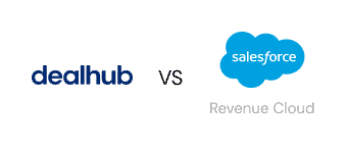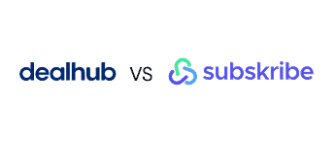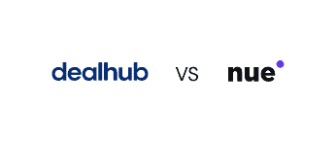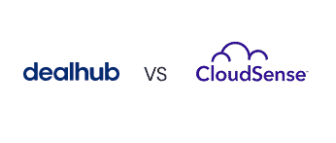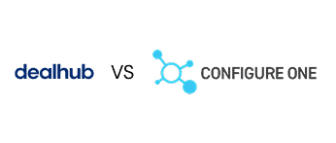Introduction
Compare DealHub CPQ and Salesforce Revenue Cloud
DealHub and Salesforce Revenue Cloud both provide powerful solutions for automating the sales process and managing the revenue lifecycle. Each includes core CPQ functionality, like guided selling, product configuration, dynamic pricing, CRM and API integrations, subscription management, and contract management, but their approaches differ.
DealHub CPQ sits at the center of DealHub’s unified Quote-to-Revenue platform, seamlessly connecting quoting with contract management, subscription billing, e-signature, and buyer engagement tools. Its intuitive interface, fast implementation, and no-code configurability make it ideal for organizations that want an agile, easy-to-adopt solution capable of supporting both straightforward and highly complex sales processes.
Salesforce Revenue Cloud, which includes Salesforce CPQ as part of its broader offering, is built for enterprises that need deep customization, advanced reporting, and full integration with the Salesforce ecosystem. With robust pricing and product configuration capabilities, Revenue Cloud is well-suited for organizations managing large product catalogs and complex global sales operations.
Product Overview
Overview of each Solution
DealHub CPQ and Salesforce Revenue Cloud are both widely used by organizations in various industries. Here’s a quick overview of each product and what it does well.
Defining DealHub Quote-to-Revenue Platform
DealHub CPQ is the core of DealHub’s unified Quote-to-Revenue solution, which brings together CPQ, Contract Management (CLM), eSignature, Subscription Management, and Billing in one connected platform. This all-in-one approach eliminates silos, helping revenue teams streamline the entire customer lifecycle from quote creation through billing and renewals.
With DealHub 2.0, the platform introduces a more flexible and composable quoting experience, enabling revenue teams to configure workflows in real time and collaborate seamlessly across departments. Its no-code implementation makes it simple to manage product catalogs, pricing rules, and approvals, while guided selling ensures reps deliver accurate, tailored quotes directly within their CRM workflow. Enhanced buyer engagement tools such as DealRoom, Deal Talk, and Deal Stream extend the platform’s value by creating a collaborative, digital-first buying experience.
Defining Salesforce Revenue Cloud
Salesforce Revenue Cloud combines Salesforce CPQ, Billing, and other revenue management tools within the broader Salesforce ecosystem. As part of the world’s leading CRM, it delivers deep integration with customer data, providing sales teams with real-time insights into accounts, opportunities, and pipelines.
Salesforce CPQ, a key component of Revenue Cloud, enables organizations to configure complex products and pricing models directly within the Salesforce interface. For businesses already invested in Salesforce CRM, Revenue Cloud offers a powerful, fully connected solution that supports large-scale, enterprise-grade quoting and revenue management needs.
Product Features
Comparison of Key Features
DealHub CPQ is designed with ease of use and agility in mind. Its no-code configuration allows revenue teams to manage pricing rules, product bundles, and approval workflows without heavy IT involvement. As part of DealHub’s all-in-one Quote-to-Revenue platform, CPQ seamlessly connects to contract management, subscription management, billing, and e-signature, ensuring the entire sales-to-revenue cycle is automated in one place.
DealHub’s guided selling helps sales teams quickly build accurate, tailored quotes, while advanced automation reduces errors and accelerates deal velocity. Features like customizable filters, visual deal tracking, and integrated buyer engagement tools (DealRoom, Deal Talk, Deal Stream) provide real-time visibility into renewals, approvals, and active opportunities. Native integrations with CRMs such as Salesforce, Microsoft Dynamics, and HubSpot give organizations a unified workflow without the need for custom development.
Salesforce Revenue Cloud takes a highly customizable approach to revenue automation. It excels at supporting complex pricing structures, product catalogs, and approval hierarchies within the Salesforce ecosystem. Businesses gain powerful functionality, such as revenue recognition, advanced approval processes, and detailed reporting, but achieving this flexibility often requires longer setup times and ongoing administration by Salesforce specialists or developers.
Its integration with Salesforce CRM is seamless, making it a strong choice for companies already invested in the Salesforce platform. However, connecting Revenue Cloud with non-Salesforce platforms may require additional development and resources.
Both DealHub and Salesforce Revenue Cloud offer strong security measures to protect sensitive sales and revenue data. DealHub CPQ and its revenue platform are built on enterprise-grade cloud infrastructure. It is ISO 27701:2019, ISO 27001, and ISO 22301:2019 certified, as well as SOC 1, SOC 2, GDPR, and CCPA compliant. The platform features role-based access controls to manage user permissions, audit logs to track versions, approvals, and e-signatures, as well as data encryption both in transit and at rest. DealHub also offers secure eSignature functionality compliant with ESIGN and UETA regulations, ensuring contracts and agreements meet industry standards.
Salesforce Revenue Cloud leverages Salesforce’s trusted enterprise security framework, which includes certifications such as ISO 27001, SOC 2, and GDPR compliance. It provides granular control over access through role hierarchies, profiles, and permission sets, as well as field-level and object-level security for sensitive data. Encryption is supported across the platform, with Salesforce Shield available as an add-on for enhanced data protection. Additionally, Salesforce provides advanced features, including continuous threat monitoring, multi-factor authentication (MFA), single sign-on (SSO), and regular third-party audits.
Below is a breakdown of the key features that each product provides.
| DealHub | Salesforce Revenue Cloud |
|---|---|
| Full quote-to-revenue: CPQ, contract management, digital sales room proposals, e-signature, billing | Full quote-to-cash: CPQ, billing, revenue analytics |
| Integration with third-party software, including Salesforce, Freshworks CRM, Microsoft Dynamics 365, HubSpot, accounting software, DocuSign, and ERP systems. API integrations sync pricing and other data into the playbook and enable advanced user management. | Provide real-time insights into customers, deals, and prospects through its integration with Salesforce’s CRM platform. Extended integrations through the Salesforce partner network. |
| Fast integration and setup within weeks with no code required. Customizable Proposal and DealRoom layouts align with the way you work. | IT implementation takes an average of 6-9 months. |
| Guided selling and advanced filtering empower sales reps to create winning proposals quickly and easily through an intuitive quoting process synced to your CRM. | Salesforce offers pre-built guided selling capabilities, but more intricate workflows may require custom coding. |
| Readily scalable for sales team growth and expansion. DealHub empowers revenue teams to create and update deal flows without technical support or developer resources. | Modifications, alterations, and upkeep often require specialized expertise, incurring additional expenses. |
| With DealRoom, digital proposals can be easily sent via one URL, allowing companies to provide their customers with one point of interaction throughout all deal stages rather than multiple files or links. | Each price quote is delivered as an attachable file, and any alterations necessitate a new version of the document. |
| Out-of-the-box contract management, document generation, e-signature, and multi-dimensional pricing models. | Additional features and licenses available for added costs. |
| Digital sales room (DealRoom) for streamlined sales negotiations. Buyer engagement insights that help sales reps improve future sales communication. | Customer communication within the Salesforce platform and its partners (like Slack). |
| Subscription, renewal, and order management capabilities with rules-based quoting for complex sales. | Subscription management and complex billing capacity. |
| Supports multi-currency price quotes with localized pricing for international companies. | Supports multi-currency quoting. Users can define currency conversion rates, apply localized pricing, and ensure accurate quotes for international customers. |
| Automated approval workflows for faster turnaround times and quote collaboration across teams and stakeholders with audit trails. Deal Stream enables deal-specific engagement insights while Deal Talk enables real-time, deal-specific messaging directly within proposals. | Automated approval workflows to ensure compliance with pricing and discount policies before finalizing deals. |
| Web-based platform. | Web and mobile (iPhone and Android) platforms. |
| Implementation teamPhone supportMobile and online customer supportKnowledge baseDealHub Academy | Phone supportKnowledge baseChatFAQs/ForumLive online supportIn-person training Documentation |
Customer Size
Ideal Customer Profiles
DealHub CPQ is designed to support organizations at every stage of growth — from scaling SaaS companies to global enterprises. Its scalability makes it straightforward to add new users, products, or business units, while its unified platform extends beyond quoting into contract management and subscription billing. RevOps teams value DealHub for combining enterprise-grade functionality with a no-code, intuitive interface that accelerates adoption across sales teams without requiring heavy IT resources.
Salesforce Revenue Cloud is also a strong option for enterprises, particularly those already committed to the Salesforce ecosystem and with the resources to manage a complex implementation. Its breadth of features makes it powerful for large-scale revenue management, but the longer deployment cycles and higher administrative overhead can be a challenge for organizations seeking faster time-to-value.
Pricing
Breakdown of Pricing Options
Both Salesforce and DealHub use usage-based pricing models, meaning that the pricing plan is tailored to each customer’s specific needs.
DealHub pricing is available upon request. It offers three plans:
- CPQ+ to generate professional price quotes and proposals in minutes
- For businesses who want the complete CPQ experience, featuring multi-dimensional pricing models, multiple sales playbooks, subscription and order management, contract management (CLM), advanced parallel approval workflows, dynamic document generation, buyer engagement insights, DealRoom (DSR) and more.
- CPQ + CLM to connect quotes and contracts and deliver a unified experience
- Quote-to-Revenue, a complete automated solution from Sales to Finance
Salesforce Revenue Cloud is an add-on to Salesforce CRM, and pricing for this specific suite of tools is not listed on the Salesforce website. Pricing can vary depending on the specific needs of your business, the number of users, and the Salesforce products you already use. It’s best to contact Salesforce directly for a quote tailored to your business needs.
Implementation costs for a customized system within Salesforce can be time-consuming and costly for businesses.
| DealHub CPQ | Salesforce CPQ | |
|---|---|---|
| Product Pricing | Contact sales | Contact sales |
| Implementation Fees | One-time implementation fee | Ongoing implementation fees for custom coding |
| Additional Licenses | No additional license fees | Additional license fees for e-sign, contract management, buyer engagement tracking |
To use Salesforce Revenue Cloud to its fullest extent, you’ll need to pay an implementation fee and possibly additional customization costs for complex use cases (i.e., custom coding). And applications related to Salesforce CPQ, like contract management, e-signature, sales proposals, and buyer engagement tracking, sometimes come with hidden license fees.
With DealHub, you’ll only have to pay a minimal one-time setup cost. You can then enjoy the advantages of having an integrated and complete sales stack for a fixed fee. And the pricing is dependent on usage, so you won’t pay more than you need to.
Pricing for DealHub CPQ is based on the organization, and prospective buyers need to talk to sales representatives about their needs. The plan is tailored to each client, and it can start at around $50 per user per month.
Summary
Considerations for Choosing Between the Two Solutions
When evaluating DealHub and Salesforce Revenue Cloud, companies should weigh factors such as implementation complexity, ease of use, scalability, and integration requirements.
DealHub CPQ is best suited for organizations looking for a modern, user-friendly solution that unifies revenue management (quoting, contract management, subscription billing, and revenue workflows) in a single platform. Its no-code interface, guided selling, and automation capabilities allow sales teams to generate accurate quotes quickly, collaborate in real time, and manage the entire revenue lifecycle without heavy IT involvement. With the recent launch of DealHub 2.0, the platform delivers greater flexibility, adaptability, and usability, raising the standard for how CPQ should support modern revenue teams.
Salesforce Revenue Cloud, which includes CPQ as part of its broader offering, remains a strong choice for companies already invested in the Salesforce ecosystem. It provides advanced customization, scalability, and seamless integration with Salesforce CRM and other Salesforce products. However, achieving its full potential often requires longer implementation cycles, specialized resources, and ongoing administration. Notably, Salesforce CPQ is no longer available as a stand-alone solution, meaning businesses evaluating it today must adopt Revenue Cloud as a whole.
FAQs
Frequently Asked Questions
DealHub CPQ is part of an all-in-one Quote-to-Revenue platform, focusing on ease of use, automation, and speed. Salesforce Revenue Cloud includes CPQ within a broader enterprise solution, offering deep customization and scalability for organizations embedded in the Salesforce ecosystem.
DealHub typically implements in 4–8 weeks thanks to its no-code, user-friendly interface. Salesforce Revenue Cloud often requires several months due to its complexity and need for specialized resources.
Mid-market businesses often benefit from DealHub’s speed, intuitive design, and unified platform. Large enterprises with complex product catalogs and existing Salesforce investments may find Salesforce Revenue Cloud better suited to their scale and customization needs.
Salesforce CPQ is no longer sold as a stand-alone product. It is now available only as part of Salesforce Revenue Cloud.

Rhonda Bavaro excels in boosting SaaS companies’ growth through innovative content marketing, thriving in the dynamic sales tech industry amidst evolving technologies that drive revenue acceleration.

